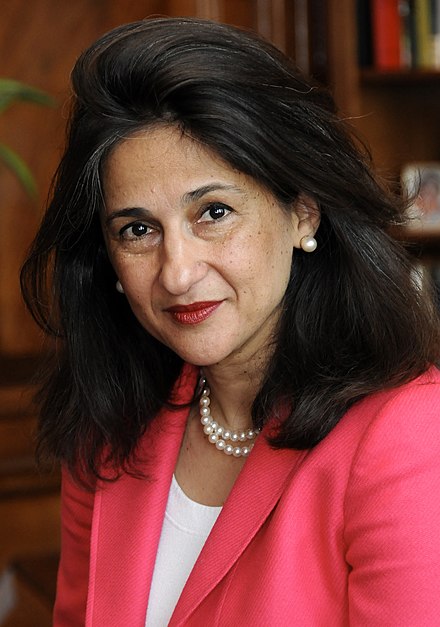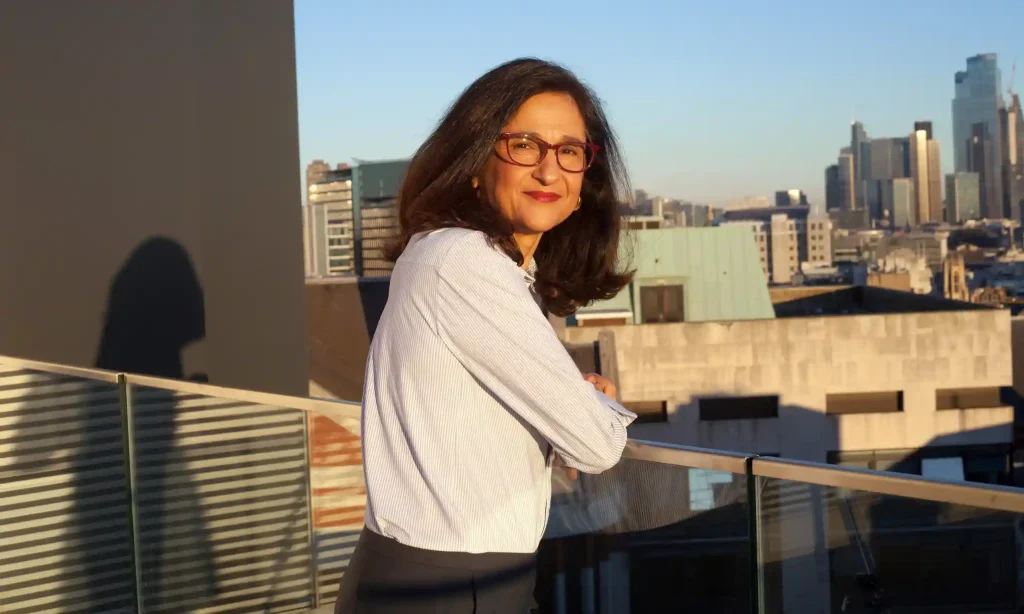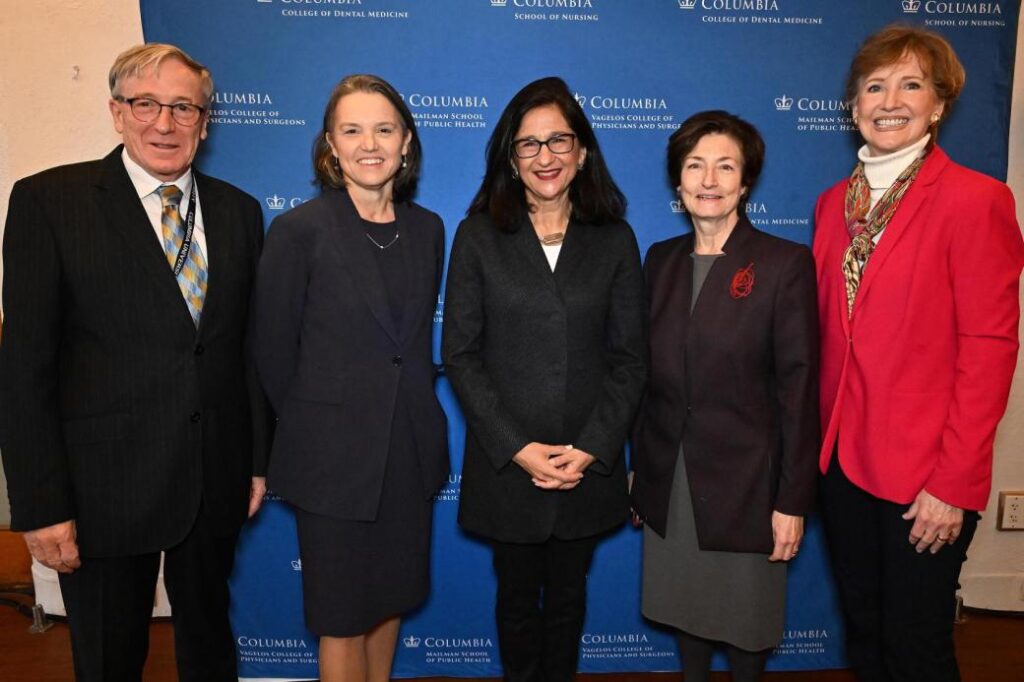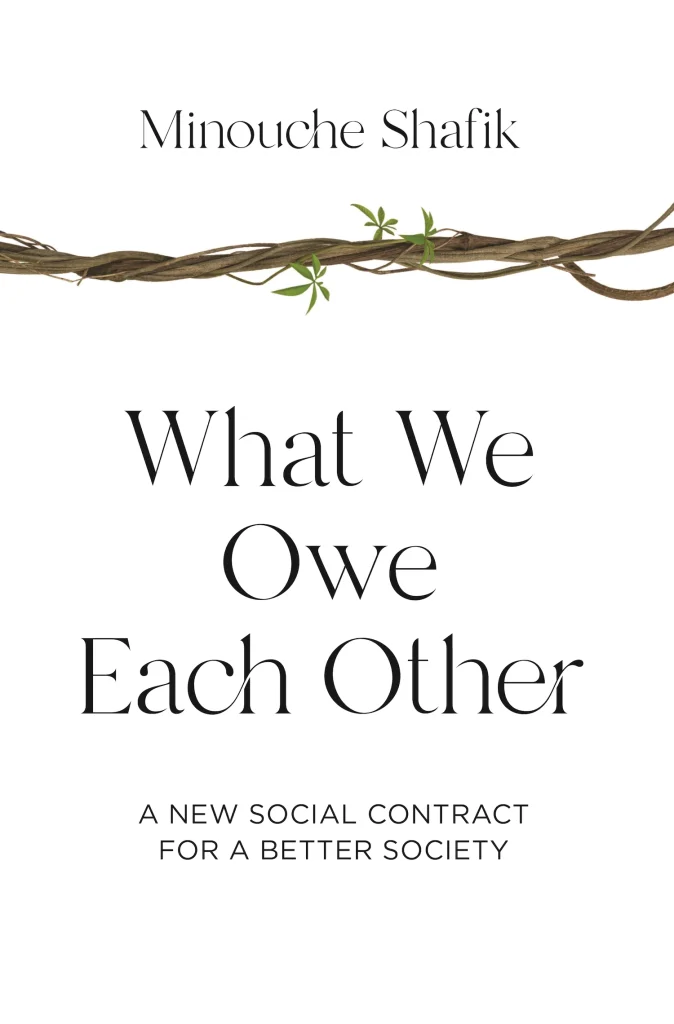Pathbreakers of Arab America--Sixth in Series: Dr. Nemat "Minouche" Shafik

By: John Mason / Arab America Contributing Writer
This is the sixth in Arab America’s series on American pathbreakers of Arab descent. The series includes personalities from entertainment, business, science, academia, and politics, among other areas. Here we highlight Nemat “Minouche” Shafik, Egyptian-born, Arab American, the first woman president of Columbia University, a Member of the British Parliament, and a world-renowned economist. Her curriculum vitae is nothing short of astounding.
Minouche Shafik, Arab American, Rare Breed of Academic, Politician, Economist
Nemat Talaat Shafik, ‘Baroness’ Shafik, was born in Alexandria, Egypt on August 13, 1962. Also known as Minouche Shafik, she is a citizen of both the U.S. and the UK. After joining the World Bank, Shafik married economist Mohamed El-Erian. With her second husband, scientist Raffael Jovine, she has twin children and three stepchildren.
Minouche’s title of Baroness Shafik derives from an official announcement of her liaison role between the London Borough of Camden and the City of Alexandria in the Arab Republic of Egypt. This title is part of the 2020 ‘Political Honours,’ which introduced her to the House of Lords on October 15, 2020.

In Britain, Minouch served as the President and Vice Chancellor of the London School of Economics from September 2017 to June 2023. On July 1, 2023, she was named the 20th president of Columbia University, the first woman since its founding in 1754.
Dr. Shafik will take over leadership of Columbia, per the New York Times, “as higher education faces tumult over cost, free speech and a likely end to affirmative action.” Her selection as the first woman leader of Columbia parallels the recent appointments of women to head other top universities, including Harvard, Dartmouth, M.I.T., the University of Pennsylvania, and George Washington University.
In a letter to the Columbia community, according to the Times, it stated, “the university’s board of trustees said it had found a perfect candidate in Dr. Shafik, 60, a brilliant and able global leader, a community builder and a pre-eminent economist who understands the academy and the world beyond it. In addition, Minouche’s international experience is worth noting, — and rare for a university president in the U. S. For example, she has served as one of the youngest vice presidents of the World Bank, a deputy managing director of the International Monetary Fund, deputy governor of the Bank of England, and is a member of the British Parliament in the House of Lords, the last position rendering her the title of ‘The Right Honourable.’
At a recent appearance at Columbia, Dr. Shafik focused on her commitment to “increase the diversity of people and ideas and lived experiences and address skeptics who doubt the value of education. We are at a moment in history where universities need to be both scholarly and relevant.” Apropos to the issue of diversity in colleges and universities, Dr. Shafik, a “tireless proponent of diversity and inclusion,” described herself as “brown.” In foreseeing the possible Supreme Court overturning of ‘affirmative action,’ she noted “Columbia would face the challenge of overhauling the university’s admissions processes.”

Minouche Shafik’s philosophy on work, cooperation, and improved roles for women
Minouche, per The Guardian, “seemed destined for the top job at the Bank of England when she arrived in 2014, but becoming the first female governor was not to be.” After spending two years as the deputy governor, Shafik quit and moved over to head the London School of Economics. Being highly skilled at diplomacy, she described her move, saying, “Oh, come on: the LSE job offer was too good to miss.”
While Minouche is known as a world-class economist, her ideas go beyond economics. We see this in her new book, What We Owe Each Other, which represents “an urgent rethinking of how we can better support each other to thrive.” The book is a takeoff on Rousseau’s social contract, which involves the “everyday mutual obligations among family, community, place of work, and fellow citizens.”
In other words, Minouche’s concerns involve caring for others, paying taxes, and benefiting from public services in a way that binds us together as a society. She says, however, “the social contract has been broken by changing gender roles, technology, new models of work, aging, and the perils of climate change.”
In her book, Minouche draws on evidence and examples from around the world, showing how every country can provide citizens with the basics to have a decent life and be able to contribute to society. “But we owe each other more than this. A more generous and inclusive society would also share more risks collectively and ask everyone to contribute for as long as they can so that everyone can fulfill their potential.”
Another aspect of Shafik’s philosophy is that she opposes “a winner-takes-all business culture that offers the spoils of capitalism only to those that rise to the top.” Furthermore, Minouche suggests that the next phase of history should be characterized by a shared endeavor, ending the extreme individualism of the last 40 years.

In particular, Minouche is concerned about how technology and the changing role of women are now the two driving forces of change. She says, “Technology because it has changed jobs and lots of people haven’t benefited. They have been left behind. They don’t have the skills and they are not in the right place, with the result that their prospects are poor.”
Minouche posits further, “And the way our whole social contract was predicated on women looking after the young and the old for free – now there are more women going to university than men…and they are employed, and the cost of them not working is really high, so you want them to work. Yet we haven’t found a way to adjust – a way to look after the young and old without women providing free labor.”
Dr. Shafik’s perspective is very practical and admirable: “I am not just a person who wants to raise taxes and share out more. I want everyone to pay their fair share of taxes and invest more in each other.”
Sources:
–“Minouche Shafik,” Wikipedia List of Arab Americans, 2023
–“Columbia Names Nemat Shafik as President, the First Woman to Lead the University,” New York Times, 1/19/2023
–“Minouche Shafik” The idea that you are successful because you are hardworking is pernicious,” The Guardian, 1/22/2022
–“What We Owe Each Other: A New Social Contract for a Better Society,” Amazon Book Review, 4/27/2021
John Mason, PhD., who focuses on Arab culture, society, and history, is the author of LEFT-HANDED IN AN ISLAMIC WORLD: An Anthropologist’s Journey into the Middle East, New Academia Publishing, 2017. He has taught at the University of Libya, Benghazi, Rennselaer Polytechnic Institute in New York, and the American University in Cairo; John served with the United Nations in Tripoli, Libya, and consulted extensively on socioeconomic and political development for USAID and the World Bank in 65 countries.
Check out our Blog here!








